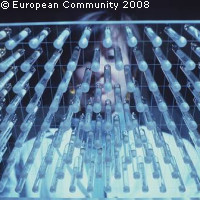New EU project to focus on membrane proteins
A new, EU-funded project will investigate membrane proteins with the aim of finding new treatments for a range of diseases. Membrane proteins are responsible for transporting chemicals and messages between the inside and outside of cells, and they are vital for every process in the human body. Defective membrane proteins have been implicated in a range of human diseases, including diabetes, heart disease, epilepsy, depression, osteoporosis, stomach ulcers and cataracts. Furthermore, the bacteria, yeasts and parasites which cause many infectious diseases also rely on their own membrane proteins, which could therefore be used as targets for the development of new drugs. The €15 million EDICT ('European drug initiative for channels and transporters') project will focus its efforts on around 80 of these membrane proteins. The project partners will map out the structure of proteins involved in diseases to identify compounds that could be developed as treatments. Meanwhile for proteins whose structure is already known, the team hopes to make real advances towards new treatments. 'Membrane proteins are seen by many as the next potential source of drug development, and so the EC is keen to fund research in this area,' said the project's coordinator, Professor Peter Henderson of the University of Leeds in the UK. 'However, they are difficult to study and are poorly understood, though the recent sequencing of the human and other genomes show they make up about one third of all proteins in all organisms, including humans.' The four-year project brings together scientists from 27 organisations in 12 countries. Among the biologists, chemists and imaging experts involved in the project are two Nobel laureates. Professor Hartmut Michel of the Max Planck Institute for Biophysics in Germany received his award in 1988 for determining the three dimensional structure of a photosynthetic reaction centre, while 1997 laureate Professor Sir John Walker of the UK's Medical Research Council won his award for working out the enzymatic mechanism underlying the synthesis of adenosine triphosphate (ATP), which our cells use to store and transfer energy. The drugs industry is also represented in the project, by the pharmaceutical giant AstraZeneca and a smaller company called Xention, which specialises in the discovery and development of ion channel drugs. 'At the moment, few groups of membrane proteins are being seriously investigated by the pharmaceutical industry, so this project will help to fill that gap,' commented Professor Henderson. 'By bringing together the best scientists in this challenging field from all over Europe, we hope to make a real advance towards new treatments for key diseases.'



